

Few feelings are worse than failing Step 1 or Step 2 CK. For so long, we’ve excelled in school. So when we fail a significant exam, it hurts more than our pride. Our identity is tied up in doing well. Thus, failure can even feel like a character flaw, like something is wrong with us.
If you didn’t pass a USMLE, it might feel like the world has ended. However, it’s not as bad as you think. I’ve worked with many students who have survived – even thrived – after a USMLE failure.
Failing your Boards doesn’t mean something is wrong with you. However, it means that there is something wrong with your approach.
In this article, you will learn:
- Pass/fail rates for Step 1 and Step 2 CK, plus the likelihood of matching after multiple attempts
- How program directors look at failures
- Practical next steps to take
- The most common reasons people don’t pass their Boards, and how to overcome them, and
- Much more
(To read 7 Most Commons Reasons Your NBMEs Aren’t Improving (And How to Fix Them), click here).
Table of Contents
Failing Step 1, Step 2 CK: How Bad Is It, Really?
If you’re reading this, you may be wondering just how bad it is if you’ve failed your USMLE. In this section, we’ll look at the pass/fail rates for each USMLE. Then we’ll discuss how residencies view failed USMLE attempts, and the impact on match rates for US grads and IMGs.
Pass/Fail Rates for Step 1 and Step 2 CK
First, let’s look at the statistics for passing Step 1 and Step 2 CK.
Step 1 Passing Rates:
| # Tested (2017) | % Passing (2017) | # Tested (2018) | % Passing (2018) | |
|---|---|---|---|---|
| MD Degree | 21,382 | 94% | 21,611 | 95% |
| 1st Takers | 20,353 | 96% | 20,670 | 96% |
| Repeaters** | 1,029 | 67% | 941 | 67% |
| DO Degree | 3,835 | 95% | 4,136 | 96% |
| 1st Takers | 3,786 | 95% | 4,092 | 96% |
| Repeaters** | 49 | 76% | 44 | 73% |
| IMGs | 17,203 | 73% | 16,443 | 75% |
| 1st Takers | 14,900 | 78% | 14,332 | 80% |
| Repeaters** | 2,303 | 41% | 2,111 | 44% |
Step 2 CK Passing Rates:
| # Tested (2016-2017) | % Passing (2016-2017) | # Tested (2017-2018) | % Passing (2017-2018) | |
|---|---|---|---|---|
| MD Degree | 21,071 | 95% | 22,367 | 96% |
| 1st Takers | 20,140 | 96% | 21,531 | 97% |
| Repeaters** | 931 | 66% | 836 | 66% |
| DO Degree | 2,581 | 94% | 3,076 | 94% |
| 1st Takers | 2,547 | 95% | 3,038 | 95% |
| Repeaters** | 34 | 68% | 38 | 74% |
| IMGs | 14,291 | 76% | 13,613 | 78% |
| 1st Takers | 11,949 | 81% | 11,469 | 83% |
| Repeaters** | 2,342 | 50% | 2,144 | 52% |
** ‘Repeaters’ represents examinations given, not number of examinees.
What do you notice? At least 5% of US MD students fail a USMLE. More than 25% of IMGs will fail one USMLE. If you’re reading this statistic, you’re not alone. Also, as you’ll see next, not passing a USMLE doesn’t doom you to a residency-less future.
How USMLE Failure Affects Residency Applications
How do residency programs view failure on a USMLE? Let’s look at the statistics.
Every two years, the NRMP surveys program directors (PDs). They ask a large number of questions about what the PDs look for in residency applicants.
One of the questions: Would your program consider applicants who fail the USMLE on the first attempt? Here are the results when looking at all PD responses for 2018:
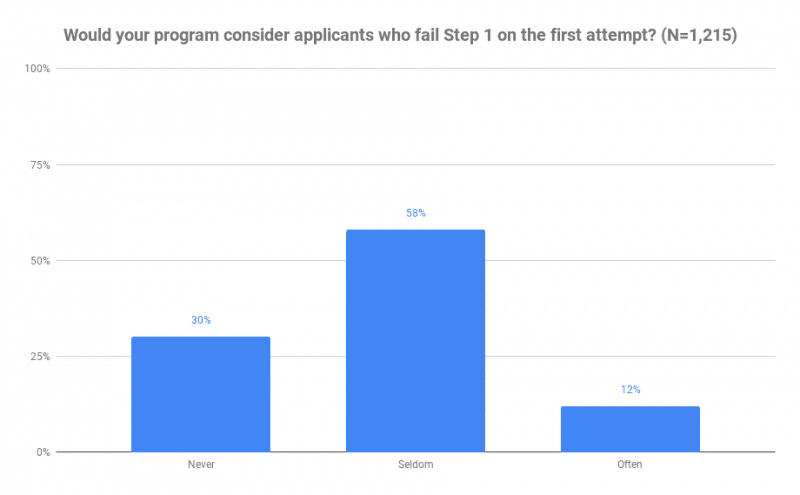
Less than 1/3 of programs say they “never” consider someone who failed Step 1
And the survey results for Step 2 CK:
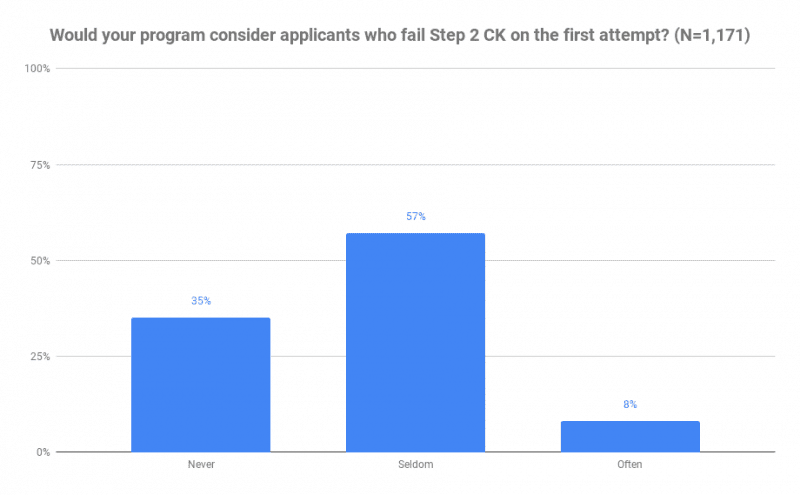
Similarly, 35% of programs say they “never” consider someone who failed Step 2 CK
The upshot? Roughly 1/3 of programs will reject your application if you have a USMLE failure. ~10% of programs will consider you regardless. In-between? Nearly 60% will “seldom” consider you. What that means is that it’s critical that you find other ways to stand out. (More on this later).
What Programs Are Most Forgiving of Failing?
While aggregate program data is interesting, you’re not applying to all residencies at once. Instead, you will likely be applying to one or a few specialties. So how does each specialty view failing Step 1 or Step 2 CK?
In these tables, we answer that question. From the same, 2018 Program Directory survey, we collected the data for each specialty. (Click on column headers to sort data).
“Would your program consider applicants who fail Step 1 on the first attempt?”
| Never | Seldom | Often | |
|---|---|---|---|
| Anesthesiology (N = 58) | 34% | 66% | 0% |
| Child Neurology (N = 33) | 27% | 70% | 3% |
| Dermatology (18) | 50% | 50% | 0% |
| Emergency Medicine (84) | 37% | 61% | 2% |
| Family Medicine (141) | 3% | 47% | 50% |
| Internal Medicine (163) | 23% | 66% | 11% |
| Internal Medicine/Pediatrics (26) | 35% | 62% | 4% |
| Interventional Radiology (14) | 64% | 36% | 0% |
| Neurological Sugery (24) | 58% | 38% | 4% |
| Neurology (37) | 27% | 59% | 14% |
| Obstetrics and Gynecology (79) | 34% | 65% | 1% |
| Orthopaedic Surgery (46) | 65% | 35% | 0% |
| Otolaryngology (32) | 56% | 44% | 0% |
| Pathology (40) | 28% | 68% | 5% |
| Pediatrics (73) | 4% | 79% | 16% |
| Physical Medicine and Rehabilitation (24) | 8% | 79% | 13% |
| Plastic Surgery (20) | 80% | 20% | 0% |
| Psychiatry (58) | 3% | 62% | 34% |
| Radiation Oncology (25) | 52% | 40% | 8% |
| Radiology-Diagnostic (42) | 43% | 52% | 5% |
| Surgery (97) | 46% | 53% | 1% |
| Thoracic Surgery (8) | 30% | 70% | 0% |
| Transitional Year (27) | 44% | 52% | 4% |
| Vascular Surgery (13) | 23% | 77% | 0% |
“Would your program consider applicants who fail Step 2 CK on the first attempt?”
| Never | Seldom | Often | |
|---|---|---|---|
| Anesthesiology (N = 57) | 40% | 58% | 2% |
| Child Neurology (N = 33) | 39% | 58% | 3% |
| Dermatology (15) | 60% | 40% | 0% |
| Emergency Medicine (83) | 46% | 53% | 1% |
| Family Medicine (140) | 7% | 60% | 33% |
| Internal Medicine (160) | 33% | 61% | 6% |
| Internal Medicine/Pediatrics (25) | 48% | 52% | 0% |
| Interventional Radiology (14) | 43% | 57% | 0% |
| Neurological Sugery (21) | 43% | 52% | 5% |
| Neurology (36) | 36% | 58% | 6% |
| Obstetrics and Gynecology (77) | 51% | 49% | 0% |
| Orthopaedic Surgery (41) | 63% | 37% | 0% |
| Otolaryngology (26) | 58% | 42% | 0% |
| Pathology (39) | 21% | 74% | 5% |
| Pediatrics (73) | 15% | 79% | 5% |
| Physical Medicine and Rehabilitation (23) | 13% | 74% | 13% |
| Plastic Surgery (16) | 81% | 19% | 0% |
| Psychiatry (58) | 14% | 55% | 31% |
| Radiation Oncology (21) | 52% | 43% | 5% |
| Radiology-Diagnostic (39) | 36% | 56% | 8% |
| Surgery (94) | 52% | 46% | 2% |
| Thoracic Surgery (8) | 25% | 75% | 0% |
| Transitional Year (26) | 42% | 54% | 4% |
| Vascular Surgery (13) | 31% | 69% | 0% |
What do you notice? There is a wide range of responses to not passing a USMLE. At the extreme end, ~80% of plastic surgery program directors who responded said they would “never” consider someone who failed Step 1 or Step 2 CK.
On the other end, in specialties like family medicine, psychiatry, pediatrics, and PM&R a Step 1 failure wasn’t a hard “no.” Fewer than 10% of these latter programs would “never” consider someone with a Step 1 fail.
How Many People Match After Failing Step 1 or Step 2 CK?
If you’ve failed the USMLE, you may already be wondering what your chances of matching are. Are you doomed?
The news isn’t as bad as you might think. For IMGs, the most recent available data is from 2013. (They stopped publishing outcomes on USMLE attempts and matching after 2013). The data suggest failing either Step 1 or Step 2 CK once decreases your chance of matching by ~20-25%.
(To read The IMG’s Guide to Obtaining Residency in the United States, click here).
For Step 1:
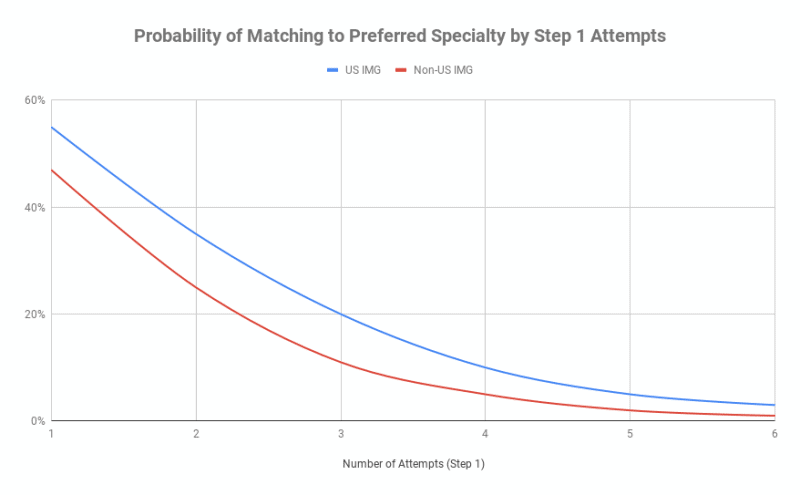
For IMGs, the probability of matching decreases with increased Step 1 attempts
And for Step 2 CK:
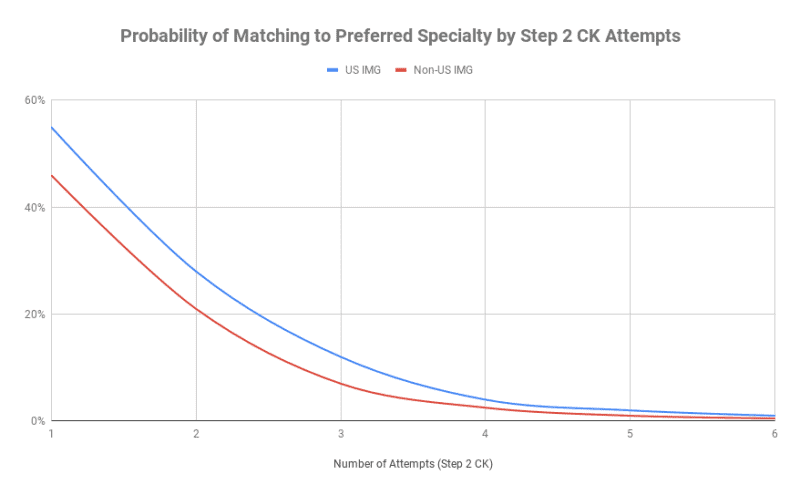
Similarly, for IMGs, the probability of matching decreases with increased Step 2 CK attempts
For IMGs, the absolute probability of matching decreases by roughly 20-25% after one failed USMLE attempt.
For US allopathic (MD) grads, the number of people matching after not passing a USMLE is likely much higher. This JAMA study found > 99% of graduates entered GME/practice in the US within 6 years of graduation. In other words, even though roughly 3% of people didn’t match in a given year, most ended up in residency/practice. In one US allopathic school, 92% of students (59 of 64) who had failed the USMLE matched.
I’ve worked with many students who have failed a USMLE and went on to residency. While your chances are lower, the door isn’t closed.
Didn’t Pass Your USMLE? Here’s What You Should Do Next
So far, you’ve learned that you’re not alone. Plenty of students have been in your shoes over the years. Plus, many programs will still look at your application.
However, just because the door isn’t closed doesn’t mean it is clear sailing. Failing a USMLE almost always indicates severe underlying problems in your preparation. With proper reflection, failing a USMLE can be the impetus for a change in your career arc. Next, we will discuss how to ensure the best possible outcome the next time around.
Current Med Students: Contact Your Administration
If you’re currently a medical student, you need to contact your administration. It’s usually safe to start with your academic advisor. If that’s not possible, you can reach out to an academic dean. Whatever you do, it’s essential to let your school know. (Note: the NBME may have already alerted your school).
Why is it important to keep your school in the loop? Because there are practical and administrative consequences you’ll need help navigating.
If you failed Step 1, often students will have to delay/pull out of clerkships. This is because some schools require students to pass Step 1 to be in clerkships. Other schools simply may want to give you dedicated time to pass your exam.
If you failed Step 2 CK, you might be close to finishing clerkships, or at least your core clerkships. You’ll need to coordinate with your school on how to proceed.
If you’re an IMG or are not in med school currently, you may not have to worry about these logistics. However, no matter your situation, you’ll need to re-evaluate your approach.
Reach Out to Others
If you didn’t pass a USMLE, it might feel like one of the darkest periods of your life. It feels awful. However, you shouldn’t go through it alone.
Under the best of circumstances, social isolation is bad for your well-being. It’s even worse when you’re undergoing adversity. Plus, adversity often tears down the masks we put up and allows for genuine connection. Indeed, some of my darkest hours have forged some of my closest friendships.

If you fail Step 1 or Step 2 CK, you might be tempted to hold everything inside. Instead, we recommend seeking out others.
Reassess Your Residency Timeline
Another thing to consider: how will not passing affect the year you apply to residency?
If you’re lucky, you may not need to delay your graduation/when you apply for residency. However, you may have to consider moving back your application by at least a year.
Why? First, problems of approach aren’t fixed overnight. You will need at least a month (and possibly much more) to study again. (More on this later). Second, remember ~60% of programs “seldom” consider applicants with USMLE fails. Extra time will help you round out your application and stand out in other ways.
(To read Get Into a Top Residency: 5 Things You Need to Know, click here).
Next, we’ll look at how to address the most common reasons people fail to maximize future success.
Reflection: Why Did You Fail, and What to Do Next Time?
A wide range of people doesn’t pass the USMLE. However, there are several commonalities among those who fail their test. Here we’ll discuss the 3 most common reasons people fail the USMLE, and what you can do to improve the next time. Then we’ll discuss test-specific advice.
Reason #1: Cramming
The most common reason students fail a USMLE is they don’t understand the material. Instead of mastering it, they memorize it, hoping to get by on “buzz-words.”
Remember, the NBME designs the USMLE to test understanding, NOT memorization. Vignettes weed out crammers.
(To read How Are USMLE Questions Written? 9 Open Secrets for Impressive Boards Scores, click here).
Why do so many people memorize rather than master the material? Often, they think they don’t have enough time and review subjects too quickly. (More on this next). Also, most of us never learned how to master the material. From elementary school onward, instead of knowing “why?” we squeezed by merely knowing “what.”
Developing mastery is the #1 most important thing you can develop to turn your USMLE disappointment into success. To know what mastery looks like, check out this Yousmle Online Course lecture.
Notice how you can make sense of things people typically memorize:
- What hormones are high/low at different parts of the menstrual cycle
- The internal/external genitalia of various genetic disorders
- Why we use hCG for pregnancy tests
Understanding the material will not only help boost your USMLE score. It will also help you be a better physician. Having to re-study for a Board exam is a great way to develop a better approach to learning.
Reason #2: Not Enough Time
If cramming is the top reason for USMLE failure, not studying for long enough is a close second. The typical lead-up to the USMLE is this:
- Early Med School: Feel overwhelmed by the volume of material. Cram just to stay afloat.
- Year Leading Up to Dedicated Study: Still feel overwhelmed. By now, have forgotten most first-year material, however, don’t know a better way to study exists. Continue to memorize to pass your school’s exams.
- Dedicated Study: Realize your knowledge is woefully inadequate. However, decide you can’t delay your exam. Pack everything into a condensed period, and rush through the material.
- 1 Week Before Exam: Panic, realize you’re not ready. You may even delay by a month. (Even though you need much longer to prepare correctly). However, you didn’t learn anything properly the first time. But because your timeline is still too short, you rush through the material.
What do you do if you if you’re in the perma-cram cycle and never have enough time? Plan on having enough time from the start. Remember:
- Cramming for 1 month + 1 month + 1 month ≠ 3 months of proper studying
Rushing through UFAP in 1 month and not retaining anything leaves you stuck in neutral. You make no forward progress. Instead, taking your time and adequately learning the material makes your preparations shorter.
Reason #3: Poor Benchmarking
When someone tells me they failed Step 1 or Step 2 CK, my next question is this:
- What were your most recent NBME self-assessments before your exam?
Most people say they either:
- Didn’t take a practice test, or
- Had predicted scores below passing, but sat for their examination anyway
Often people tell me that their school put pressure on them. (If your school pressures you into taking your exam when you’re predicted to fail, shame on them). Others say they were hoping for an exceptional test day to boost their score.
People who take their test before they’re ready almost always regret it. My advice? Don’t take your test without evidence of being close to your minimum acceptable score.
Next, let’s look at test-specific reasons why people fail.
Test-Specific Observations Why People Fail Step 1 and Step 2 CK
Why do people fail Step 1 or Step 2 CK? It’s almost always due to a lack of understanding of the material. For Step 1, they usually don’t understand the pathophysiologic mechanisms of the body. For Step 2 CK, they struggle with interpreting the vignettes and rely on buzz-words.
Remember, failure on a USMLE isn’t due to an immutable character flaw. Instead, it’s a problem of approach. It takes courageous self-reflection to address, however, the potential payoff is immeasurable.
Concluding Thoughts: Failure is a Powerful Catalyst for Change
I knew someone once who was rejected from all but 3 med schools he applied to. What was shocking was he had scored in the 99%ile on the MCAT and had a perfect science GPA.
So how did he get rejected by almost everywhere? With only a so-so research background, he had applied to MD-PhD programs. The problem? For MD-PhD applications, research experience is king, not scores. In other words, his approach had been all wrong.
That person? It was me.
It’s easy to measure our self-worth by external measures of success. I felt awful, and still feel a little embarrassed when I tell that story. However, failure often is the most potent catalyst for positive change.
After that failure, I scrutinized my approach to applications. It became clear I needed to tell a more compelling narrative, not just have high numbers. I also needed to match that narrative to what programs were looking for.
I worked hard to change my approach, and it paid off. In med school, I won multiple national scholarships, two for $10,000 each. I honed my residency application and was ranked-to-match at all my top choices.

Disappointment is an incredible growth opportunity.
Adversity Allows Us to Take An Honest Look at Our Approach
Peel back the veneer of invincibility we hide behind in medicine. You’ll find many similar stories of failure spring-boarding future success.
One IMG I tutored tells me to this day that failing her USMLE was the best thing that could have happened to her. Why? Because she realized her approach was wrong, and completely revamped it. Her Step 2 CK score? 261. She matched at her top choice Ob-Gyn program, a competitive field for everyone, let alone for IMGs.
If you didn’t pass your USMLE, it might feel like the end of the world. Instead, think of it as the chance to make the hard changes that will make you the person you want to become.
At Yousmle, we’ve helped lots of students who struggled to pass their USMLE. To learn more about how we can help you change your approach to master – not memorize – for impressive Boards scores, contact us here.
What do you think? Has your perspective changed on failing a USMLE? Let us know in the comments!
Photos by Annie Spratt, Ales Me.

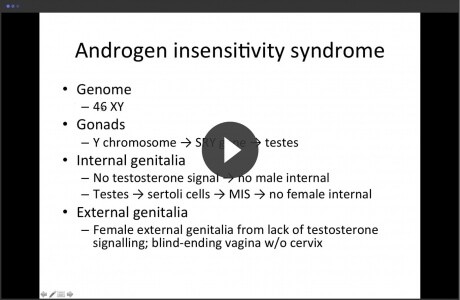







Pased all the NBME exams yet failed step one .WS in the bar just before the passing score .Got 88th percentile bit did not pass .Dont know what to do .